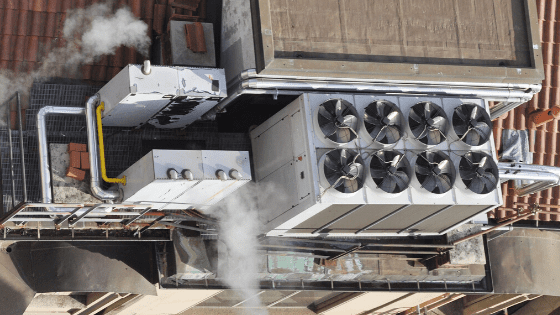 Sooner or later a commercial HVAC system will need substantial replacement of its internal parts. You can extend the life of your system through proactive maintenance, but wear and tear will accumulate.
Sooner or later a commercial HVAC system will need substantial replacement of its internal parts. You can extend the life of your system through proactive maintenance, but wear and tear will accumulate.
When that time comes, it’s crucial to call on a commercial HVAC contractor you can trust.
Your HVAC contractor has a big role in lowering costs associated with your facility. In addition to reducing maintenance bills and prolonging component life, contractors ensure your HVAC is running according to performance and efficiency standards.
Relatively minor HVAC problems can add up to substantial building costs. For example, your HVAC can be 16%-20% more efficient when its air filters are changed regularly.
If your HVAC installation is 10 years old or more, it’s time to start the search for a contractor who can bring your system into the next decade. But how can you get the quality you expect?
Only a few HVAC contractors are truly the best. However, they all have things in common.
Here’s what to look for when choosing your commercial HVAC contractor:
1. Licensure and Industry Experience
When working with an HVAC system, you don’t want a general contractor or “Jack of all trades.” The HVAC is one of the most expensive and important building systems of all. Each element of the system works together to help you control costs. You need quality through and through.
While there is no single standard for “how much” experience you need, a good rule of thumb is that your contractor should have more years of experience than your HVAC system does. That means a minimum of ten years of experience and industry credentials to back it up.
HVAC industry licensing standards vary according to state. In addition to a license certifying years of experience, most contractors need to hold insurance to protect you from the unexpected. There are several industry associations that can speak to a contractor’s abilities, too.
Remember, the compressor is the most complex and pricey part of your HVAC system. More experience means greater familiarity with compressor brands like Trane, Carrier, Copeland, and York. Knowing multiple brands helps minimize the amount of replacement that needs to be done.
2. Detailed Evaluation of the Space
When it comes to an HVAC system, there is no “one size fits all” solution. Most commercial environments have limited options for relocating the compressor unit and still getting the kind of performance you need. The overall layout of the ventilation system also plays a role.
An on-site evaluation of the space is the best way for your contractor to come to grips with the details of the project at hand. That’s an important step toward getting you a complete statement of work and cost estimate to guide your decision when comparing contractors.
Remember, it’s best to get everything in writing before you make a final decision. With enough experience, a team can be accurate and upfront about the time and budget your project needs. A good team plans for the unexpected rather than leaving you to bear unexpected costs.
3. Trustworthy Client References
Client references are becoming more important for businesses of all kinds. No doubt you’ve seen reviews on third-party sites like Yelp. Contractors also collect and post testimonials on their own site. Remember to take all these with a grain of salt.
Negative reviews on third-party sites could be posted by a disgruntled competitor. At the same time, look for evidence that reviews on the contractor website are legitimate. A good method is to call and ask the team to put you in touch with a few satisfied customers.
4. Rebates and Special Offers
Different cities and states offer occasional tax rebates for choosing energy-efficient building systems, especially equipment tested to Energy Star standards. It’s hard for customers to keep track of these opportunities, which are constantly changing – the contractor should be able to handle it.
5. Efficient HVAC Equipment
Efficiency is crucial when it comes to your long-term cost of ownership. Brands are always developing new systems to make HVAC operations more efficient, including proactive building management applications that can spot performance problems while they are still easy to fix.
One thing to look out for is a familiarity with remanufactured compressors. A remanufactured commercial compressor gives you the best value for your investment. This can represent a savings of 40% versus buying an OEM compressor. It can also cut weeks off your turnaround time.
A remanufactured compressor is completely disassembled and components are replaced with all new or requalified parts. Not only should your contractor understand this process, but also know how to perform the installation to maximize the benefits to you.
No one looks forward to replacing an HVAC system. However, the right contractor can save you money and add value for years to come. Spending a little extra time on your research is well worth it.












